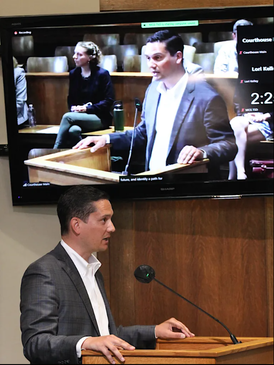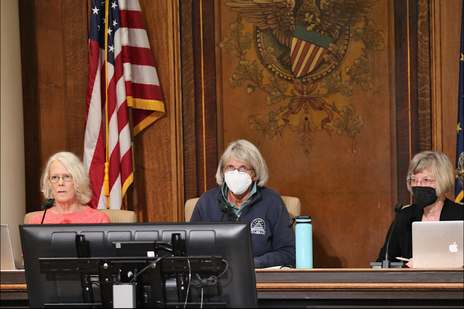|
NOTE: This article that highlights President & CEO, Eric Spoonmore's, involvement was published in the August 3, 2022 B Square Bulletin by Dave Askins.  The city of Bloomington is now interested in purchasing Monroe County’s convention center and possibly other land from the county government, in order to pursue the expansion of the facility. That’s the message that was conveyed to county commissioners during public comment at the start of their Wednesday meeting, when Greater Bloomington Chamber of Commerce president Eric Spoonmore told the commissioners that “a viable path forward for convention center expansion” could “involve a transfer of assets from the county to the city.” Spoonmore said the city of Bloomington is “willing to reasonably compensate the county.” No dollar figures were mentioned by Spoonmore or by deputy mayor Don Griffin, who followed Spoonmore to the public mic. Griffin wrapped up his remarks in under a minute, saying, “We’re ready to talk. I’m ready to listen. And let’s move forward.” The expansion project which was supposed to be a joint venture of the county and city governments, has been stalled since early March 2020, before the pandemic hit. The county and the city were having trouble coming to terms over the selection of members for a capital improvement board, which could provide governance for the expanded convention center. If the city were the sole governmental entity undertaking the expansion, that work would not require the kind of close collaboration between the city and the county, which up to now has not been achieved.  Spoonmore has been conducting a kind of shuttle diplomacy between the city and the county over the last few months, working in a kind of race against what he sees as possible action by the state legislature in early 2023, to sunset food and beverage taxes across the state. That’s the tax that is supposed to pay for the convention center expansion. County commissioners did not respond to the pitch during their Wednesday meeting, which had a light agenda. It wrapped up in about a half hour. The three-member board of commissioners consists of Julie Thomas, Lee Jones, and Penny Githens. After the meeting they told The B Square they could not comment on the city’s proposal, because they had not seen any of its details. In particular, they had not seen any dollar amounts, or the specific real estate that might be involved. Speaking to The B Square, board of commissioners president Julie Thomas put the city’s convention center proposal in the context of the other significant work that requires the county’s focus, which includes the replacement of the county jail. Besides the convention center itself, the county owns additional land, which it acquired for the purpose of the convention center expansion, including the parcel at 3rd and Walnut streets, where the former NAPA auto parts store sits. That building has been converted for use as an election operations center at least for this year. Griffin told The B Square that additional land besides the convention center could be “open for discussion” for whatever deal the city and the county might reach. The basic pitch that the city would purchase the existing the convention center was supported by some additional speakers at Wednesday’s meeting, who followed Griffin: Talisha Coppock (Downtown Bloomington, Inc. executive director); Mike McAfee (Visit Bloomington executive director), Kirby Brown (general manager at Aimbridge Hospitality which operates SpringHill Suites by Marriott in downtown Bloomington); and Jennifer Pearl (president of the Bloomington Economic Development Corporation). Spoonmore had hoped to get a spot on this week’s meeting agenda, telling commissioners, “Despite my best efforts, I wasn’t able to get a spot on your agenda this week.” Spoonmore told them that the county council would have the item on its meeting agenda next Tuesday (Aug. 9). Spoonmore said there could be a more thorough discussion at the next week’s county council meeting on the details of the proposal. The county council is the fiscal body for the county government, so it would have to approve any real estate deal, along with the board of commissioners. Griffin responded to a question from The B Square about possible dollar amounts: Would dollar figures be revealed at next Tuesday’s county council meeting? “Maybe,” said Griffin. Wednesday’s remarks to the commissioners were just a “baby step” in the process, Griffin said. Spoonmore is a former county councilor, who took the chamber job in November last year. In 2017, it was the county council that had the sole authority to enact the countywide 1-percent tax on prepared foods and beverages. On the county council’s contentious 4–3 decision that year to enact the tax, Spoonmore voted against it. Spoonmore told The B Square after Wednesday’s meeting of the county commissioners that if a deal had been on the table to have Bloomington acquire the convention center, like the city is now proposing, he would have voted for the food and beverage tax as a county councilor in 2017. The other two votes on the county council against the food and beverage tax were Lee Jones, who is now a county commissioner, and Marty Hawk, who still serves on the county council. The majority who voted for enacting the food and beverage tax were Ryan Cobine, Shelli Yoder, Geoff McKim, and Cheryl Munson. Of those four, only Munson and McKim still serve on the county council. The minutes from the Dec. 13, 2017 county council meeting, when the food and beverage vote was taken, show some consideration of an alternative approach to funding the expansion of the convention center—lobby the state legislature to allow Monroe County to increase its 5-percent innkeeper’s tax to 10 percent. One of the arguments for that approach would be that visitors, not residents, would be paying for the expansion. Even if the city of Bloomington were to own the convention center, revenues from the innkeeper’s tax—which is used to fund debt and maintenance on the facility—would still be in the bailiwick of the county. It’s the convention and visitors commission that oversees those funds, and it’s the county government that makes appointments to the commission. In fall of 2019, there was some concern about whether the revenues from the food and beverage tax would be enough to pay for the bonds that would be issued to fund the convention center expansion. Revenues from the tax took a modest hit during the pandemic, but were quick to rebound and are now exceeding forecasted numbers—but some of that increase is due to general inflation. Estimated construction costs for the expansion. Support from the three-member board of commissioners for a deal to transfer real estate to the city of Bloomington involves the basic political arithmetic of counting to 2—a majority of commissioners. Those votes might come from new commissioners. If Githens wins her race in November against Republican Dave Hall for the District 62 state house seat, her commissioner seat will be filled through a Democratic Party caucus. If there’s a Democratic Party caucus campaign to fill the vacancy on the board of commissioners left by Githens, a key question for candidates could be: Do you support selling the convention center to Bloomington? The same goes for the seat currently held by Lee Jones, who is opposed by Republican Perry Robinson in her re-election bid. If Jones were to lose that race, that could set up Robinson to vote on the question of selling the convention center. The county council’s Tuesday Aug. 9 meeting, when the city’s convention center proposal is supposed to receive some more detailed discussion, is set to start at 5:30 p.m. The agenda will be posted on the county council’s website.
0 Comments
Leave a Reply. |
Chamber NewsThis blog contains press releases, other news updates from the Chamber, news articles and radio interviews featuring interviews with the Chamber and team members, and much more! Categories
Categories
All
Archives
Archives
July 2024
|
|
Copyright The Greater Bloomington Chamber of Commerce. All Rights Reserved.


 RSS Feed
RSS Feed
